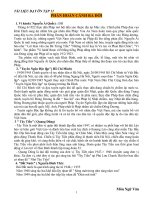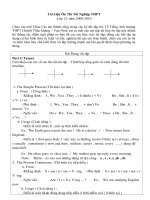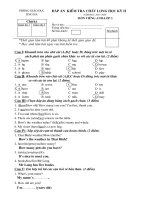TÀI LIỆU ÔN TẬP MÔN TIẾNG ANH 8
Bạn đang xem bản rút gọn của tài liệu. Xem và tải ngay bản đầy đủ của tài liệu tại đây (140.81 KB, 6 trang )
<span class='text_page_counter'>(1)</span><div class='page_container' data-page=1>
UBND TỈNH KON TUM <b>NỘI DUNG ÔN TẬP THỜI GIAN HỌC KHÔNG HỌC TẬP TRUNG</b>
<b>SỞ GIÁO DỤC VÀ ĐÀO TẠO MÔN: TIẾNG ANH 8 - NĂM HỌC 2019 - 2020</b>
<b> TỪ NGÀY: 17/02 - 22/02/2020</b>
<b>A. LANGUAGE CONTENTS</b>
<b>1. VOCABULARY: Các em sẽ ôn lại từ vựng về chủ đề Leisure Activities, Life in the Country, </b>
Peoples of Vietnam<b>.</b>
<b>2. GRAMMAR: </b>
<i><b>2.1. Gerunds :</b><b> </b></i>
Gerund được gọi là danh động từ. Là hình thức động từ được thêm -ING và dùng như một danh từ.
V + ing Gerund (danh động từ )
- Một số động từ chỉ sở thích các em cần nhớ:<b>adore, love, like, enjoy, fancy, prefer, don’t mind, </b>
<b>dislike, don’t like, hate, detest.</b>
- Ngoài ra các em cần lưu ý một số động từ theo sau bởi danh động từ:
<b>to finish, to prevent (ngăn cản), to avoid (tránh), to delay (hoãn lại), to enjoy (thích), to deny</b>
<b>(chối bỏ), to dislike, to consider (cân nhắc), to imagine (tưởng tượng), to risk (liều lĩnh), to</b>
<b>support (ủng hộ), to suggest (đề nghị), to quit (từ bỏ)...</b>
<i><b>2.2. Comparative adjectives and adverbs (So sánh hơn của tính từ và trạng từ) </b></i>
<b>* Comparative adjectives (So sánh hơn của tính từ):</b>
<b>Short adj – ER + than</b>
<b>More + long adj + than</b>
* Comparative forms of adverbs (So sánh hơn với trạng từ):
a. Đối với hầu hết các trạng từ chỉ thể cách tận cùng là ly: more/ less + adv + (than)
b. Đối với các trạng từ chỉ thể cách có hình thức giống tính từ: adv + er + (than)
<b>fast → faster, hard → harder, early → earlier, late → later</b>
c. Một số trạng từ chỉ thể cách bất quy tắc:
<b>well → better, badly → worse</b>
<i><b>2.3. Questions.</b></i>
Câu hỏi tìm kiếm thơng tin thường được bắt đầu với các Wh- words như:
<i><b>where (place), when (time), why (reason), who (person).</b></i>
<i><b>2.4. Articles: a, an and the</b></i>
* Cách dùng mạo từ a:
- Dùng trước một danh từ đếm được số ít.
- Được dùng để chỉ nghĩa “any, every”
* Cách dùng mạo từ an:
- được dùng thay cho a trước một danh từ đếm được số ít khi nó phát âm là một nguyên âm.
* Cách dùng mạo từ xác định the:
- được dùng trước một danh từ chỉ đối tượng được cả người nói lẫn người nghe biết rõ đối tượng
nào đó: đối tượng đó là ai, cái gì.
- được dùng khi vật thể hay nhóm vật thể là duy nhất hoặc được xem là duy nhất.
- được dùng với hình thức so sánh nhất.
<b>3. SKILLS: </b>
</div>
<span class='text_page_counter'>(2)</span><div class='page_container' data-page=2>
Activities
<b>B. EXAMPLES</b>
<b>2.1. Gerunds</b>
<b>+ Danh động từ làm chủ ngữ: Going to the cinema is fan.</b>
<b>+ Đứng sau giới từ: I am thinking about going camping in the mountain.</b>
<b>+ Danh động từ làm tân ngữ sau một số động từ: He likes </b>
swimming.
<b>2.2. Comparative adjectives </b>
<b>Short adj.: China is bigger than India.</b>
<b>Long adj.: Gold is more valuable than silver. </b>
* Comparative adverbs
- Can you walk more slowly? I can’t catch up with you.
- Hanh acts less responsibly than anyone here.
- The rain is coming. Let’s run faster.
- I believe you’ll do better in the next test.
<b> 2.3. Questions.</b>
- Where do you live? In Paris.
- When will we have lunch? At 1p.m.
- Why hasn’t Tara done it? Because she can’t.
<b>2.4. Articles: a, an and the</b>
- Pao needs a costume for the festival.
- A lion lives in the jungle.
- There is an exhibition of Cham arts in the city.
- There’s a festival in my village. The festival is very old.
- The Kinh speak Vietnamese.
- The Odu have the smallest number of people.
<b>C. PRACTICE</b>
<b>I. Circle the correct answer (A,B,C or D) to complete each sentence.</b>
<b>1. Tet is an occasion for people to show their </b> to their ancestors.
<b> A. respect </b> <b>B. society </b> <b>C. remember </b> <b>D. reserved </b>
2. They spent 2 hours how to make Chung Cake.
A. to learn <b>B. learn </b> <b>C. learning </b> <b>D. to learning </b>
3. Most ethnic minorities live in areas.
A. mountainous B. rural <b>C. urban D. modern </b>
4. Vietnam is a multi-cultural country with over 50 ______ groups.
A. popular <b>B. rich </b> <b>C. ethnic </b> <b>D. major </b>
5. Lan is hooked ______ K-pop.
A. at <b>B. on </b> <b>C. in </b> <b>D. to</b>
6. Parents often prevent their children from the computer games.
</div>
<span class='text_page_counter'>(3)</span><div class='page_container' data-page=3>
7. Banh Chung is one of the foods in Vietnam.
A. complex <b>B. traditional </b> <b>C. disgust </b> <b>D. tasteless</b>
8. When you do such as football, volleyball, you develop team spirit.
A. outdoor activities <b>B. team sports </b>
<b> C. indoor activities </b> <b>D. individual activities </b>
9. Hmong is an ethnic .
A. minority <b>B. area. </b> <b>C. people </b> <b>D. region. </b>
10. is the largest ethnic group? - The Kinh
A. Whom <b>B. When </b> <b>C. Who </b> <b>D. Why </b>
11. The boys often help their parents to _________ water from the village well.
A. gather <b>B. collect </b> <b>C. give </b> <b>D. find </b>
12. In the countryside, people can see the ______ fields stretching to the horizon.
<b>A. peaceful </b> <b>B. vast </b> <b>C. quiet </b> <b>D. nomadic</b>
13. ______ month is the Hoa Ban Festival of the Thai people held in?
A. When <b>B. Which </b> <b>C. How many </b> <b>D. How often </b>
14. It is typical of the cultural life of Thai people.
A. some <b>B. a </b> <b>C. the </b> <b>D. φ </b>
15. An old woman was the goats up the mountainside.
A. riding <b>B. taking </b> <b>C. herding </b> <b>D. running </b>
16. The sentence “c u 2moro” means:
A. See you tomorrow <b>B. Nice to meet you</b>
C. Thanks to you <b>D. Chat you tomorrow </b>
17. A ______ is a type of box that people use for keeping bees in.
<b>A. beehive </b> <b>B. kennel </b> <b>C. grassland </b> <b>D. set</b>
18. Many People are computers and mobile phones. They use them a lot.
A. bored with B. addicted to C. worried about D. afraid of
19. I love with my best friend on the weekend. We go window- shopping or to the cinema.
A. chatting B. texting C. hanging out D. visiting
20. My younger sister has found a .kit in the storage.
A. CD B. origami C. craft D. book
<b>II. COMPARATIVE ADJECTIVES AND ADVERBS </b>
<b>Complete the sentences, using the comparative form of the adjectives and adverbs.</b>
1. It is (noisy) ……….. in the city than it is in the country.
2. The English test was ……….(easy) than I thought it would be.
3. English is thought to be (hard) ………than Math.
4. My house is (cheap) ………hers.
5. Her office is (far) ………away than mine.
6. Tom is (handsome) ………than David.
7. He did the test (bad) ………than I did.
8. A boat is (slow) ……..than a plane.
9. My new sofa is (comfortable) ………than the old one.
10. My sister dances (good) ………than me.
11. This road is (narrow) ………than that road.
12. He drives (careful) ……….than his brother.
13. Country children play (free) ………on streets than city children.
14. Life in a small town is (peaceful) ………than that in a big city.
</div>
<span class='text_page_counter'>(4)</span><div class='page_container' data-page=4>
<b>III. Make the questions from the underlines words or phrases.</b>
1. Vietnam has 54 ethnic groups.
……….?
2. Kinh people account for 87% of the country’s population.
……….?
3. The other 53 ethnic minority groups mainly inhabit in mountain areas.
……….?
4. Among ethnic minorities, the most populated groups are Tay, Thai, Muong, Hoa, Khmer, Nung…..
……….?
5. The Vietnamese government has issued specific policies and special treatments in order to enhance
the living standards of mountainous people.
……….?
6. People should make great effort to preserve traditional cultural identities of each ethnic minority
group.
……….?
7. The Cham people once boasted a flourishing culture early in the history.
……….?
8. The least populated group is Odu with several hundred people.
……….?
9. The Yao people is always proud of their elaborate costumes.
……….?
10. The traditional cultural identifies of ethnic groups are diverse and unique.
……….?
<b>Reading comprehension</b>
<b>IV. Choose the word or phrase among A, B, C or D that best fits the blank space in the </b>
<b>following passage.</b>
<b>COMMUNAL HOUSE (RONG HOUSE)</b>
The Rong House can only be (1)………..in villages to the north of the Central Highlands, especially
in Gia Lai and Kon Turn provinces. It is a large, imposing, beautifully decorated stilt house built (2)
……….. in the middle of the village. It is where community activities (3)………..: meetings,
wedding ceremonies, or playing ceremonies. It is also the place for for reception of guests. The Rong
house of each ethnic group has its own architectural style, design, and décor. Yet there are shared (4)
……….. In the village, it is often (5) ……….house roofed with yellow-dried thatch leaves and
having 8 big wood columns. The rafters are decorated with patterns of bright colour, depicting
religious scenes, legendary stories about ancient heroes, stylized animals, and other familiar things of
the village life. The most distinction of the decor of the Rong House is the (6) ………. Of the brilliant
God of Sun. The Rong House is a (7) ………of the culture of Central Highlanders, an age-old and
stable culture. The bigger the house, the wealthier the village is. It is a (8) ………of the whole
village.
1. A. found B. find C. to find D. finding
2. A. on B. in C. at D. under
</div>
<span class='text_page_counter'>(5)</span><div class='page_container' data-page=5>
6. A. portrait B. photo C. image D. painting
7. A. signal B. sign C. symbol D. scene
8. A. design B. pride C. proud D. respect
<b>V. Read the following text, and do the tasks below.</b>
<b>MY VILLAGE</b>
1…………..
I live in a village by the Mekong River. Every day, like most of my friends, I walk to school. It is
three kilometres away. After class, I often help my mother collect water from the river and feed the
chickens. At the weekend, the villagers often gather at the community hall where there is a TV. The
adults watch TV, but more often they talk about their farm work and exchange news. The children
run about, playing games and shouting merrily. Laughter is heard everywhere.
2……….
My father sometimes takes me to the market town nearby where he sells our home products like
vegetables, fruits, eggs ... He then buys me an ice cream and lets me take a ride on the electric train in
the town square. I love those trips.
3………..
On starry nights, we children lie on the grass, looking at the sky and daring each other to find the
Milky Way. We dream of faraway places.
<b>1. Choose the correct heading for each paragraph.</b>
<i> Our dreams</i> <i> Life in the village My trips to town</i>
<b>2. Find a word/ phrase from the passage which matches the definition.</b>
a. Get water from a river and bring it home. :………..
b. Give food. :………..
c. A place where the villagers can gather for important events. :……….
d. A place where a street is used for the locals to sell their home products. :………
e. Sit on a bus or a train for it to take you about. :……….
f. Challenging somebody to do something difficult. :………..
<b>3. Answer the questions </b>
1. What does the boy often do to help his parents after class?
………..
2. When does the villagers gather at the community hall?
………..
3. Do all the villagers gather at the community hall at the weekend to talk about their farm work and
exchange news? <sub></sub>………..
4. Who sometimes takes him to the market town nearby ?
………..
5. What does he sell at the market?
………..
6. Does he like to ride on the electric train on his trips to town?
………..
7. What do the village children dream about?
………..
8. Do the village children dare to each other to find the Galaxy?
………..
<b>Writing skills.</b>
</div>
<span class='text_page_counter'>(6)</span><div class='page_container' data-page=6>
1. The Cham ethnic group/ a population/ about 100,000.
________________________________________________________________________
2. They/ live mostly/ the coast/ between Ninh Thuan/ Binh Thuan Provinces/ or/ the Cambodian
border/ around Chau Doc.
________________________________________________________________________
3. The Cham/ a tradition/ wet rice cultivation.
________________________________________________________________________
4. Handicrafts/ fairly well-developed/ especially silkworm textiles/ handmade pottery wares.
________________________________________________________________________
5. Both men/ women/ wear/ long-piece sarongs/ cloth wrappers.
________________________________________________________________________
6. Main colour/ their daily dress/ cotton white.
________________________________________________________________________
7. Chief means/ transporting goods/ farm produce/ black-basket.
________________________________________________________________________
8. Most important festival/ called Bon Kate/ held/ near the Cham towers/ the tenth month/ the Lunar
year.
____________________________________________________________________
<b>VII. Write a paragraph (80-100 words ) about your leisure activities.</b>
<b>Your writing: </b>
………
………
………
………
………
………
………
………
………
………
………
………
………
………
………
………
</div>
<!--links-->









